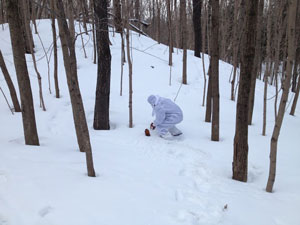Scientists in Canada have shown that snow acts as a sink for nanosized particles and certain organic constituents from car exhausts.

Snow for the experiment was collected from a park in Montreal, where it snows for around 5 months of the year
Air pollution is recognised as a leading environmental driver of cancer deaths, which makes the fate of these toxic and carcinogenic aerosols from car exhausts important for informing changes in emissions and air quality regulations, and technologies, in countries with cold winters.
Anna Lea Rantalainen, an environmental chemist at the University of Helsinki, Finland, says the work raises further questions: ‘It seems that snow is efficient at removing aerosol particles from the air, but what happens after the snow has melted?’ If the sink is temporary, pollutant emissions could increase rapidly in industrialised areas when snow melts. ‘This is not just important for Canada, but other industrial regions like China that emit very diverse compounds, which are subject to transport around the globe,’ cautions Ariya.
Please visit Chemistry World to read the full article.
Role of snow and cold environment in the fate and effects of nanoparticles and select organic pollutants from gasoline engine exhaust*
Yevgen Nazarenko, Uday Kurien, Oleg Nepotchatykh, Rodrigo B. Rangel-Alvarado and Parisa A. Ariya
Environ. Sci.: Processes Impacts, 2016, Advance Article
DOI: 10.1039/C5EM00616C
*Access is free through a registered RSC account until 25 February 2016 – click here to register










